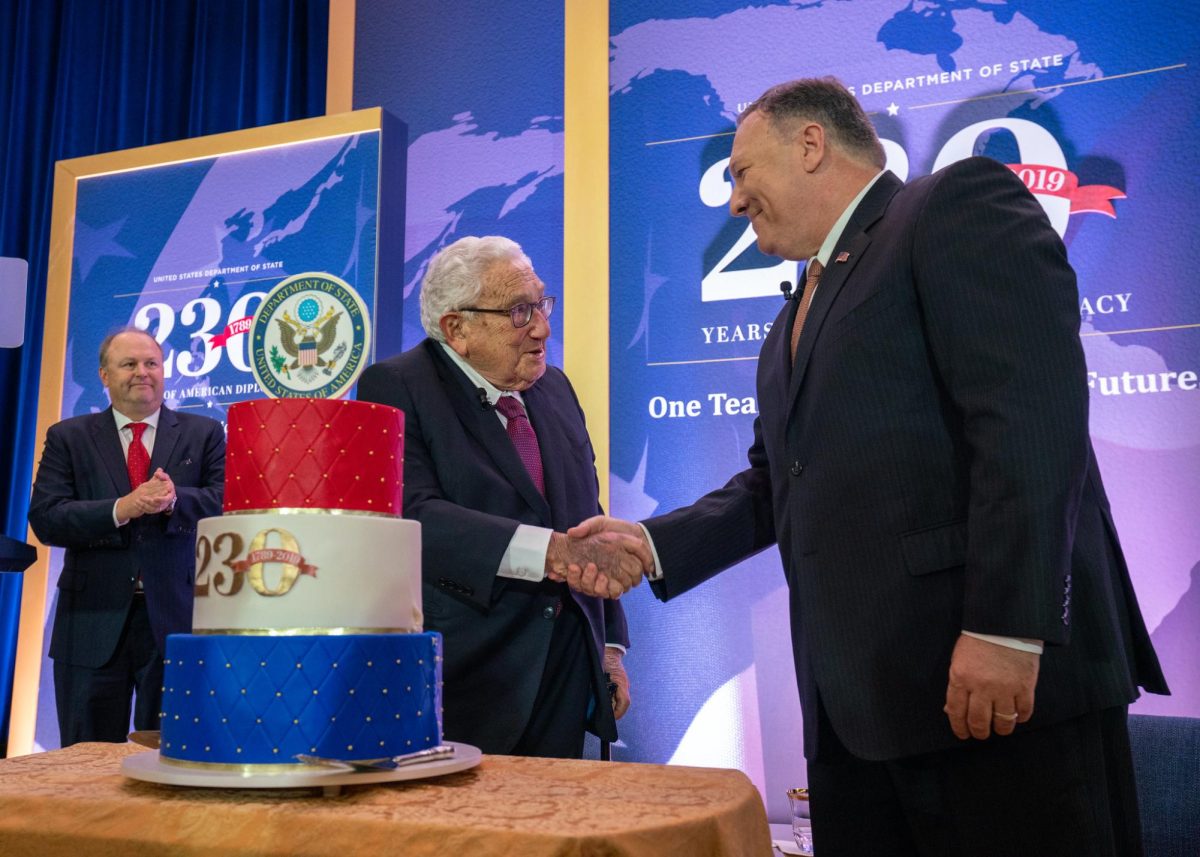From orchestrating clandestine bombings in Cambodia to involvement in Latin American governments, few historical figures have left more of a controversial legacy than former 56th secretary of state Henry Kissinger. He served as secretary for four years, later becoming an international consultant and lecturer. His actions and decisions were deeply formative to the state of foreign governments and America’s involvement in overseas conflicts today.
Kissinger was born into a Jewish family on May 27, 1923 in Fürth, and as the Nazi Party rose to power, the Jewish community faced increasing persecution. Kissinger and his family emigrated to New York City as Jewish refugees due to this persecution when he was 15.
“He came to America not knowing anything,” Model United Nations deputy secretary general Sam Parupudi (11) said. “He only knew German and was so smart that he was able to work his way up a political ladder and learn English. This guy was a genius. No matter what you think about his policies, he was able to make his way all the way to being Nixon’s right hand man.”
In 1947, Kissinger joined Harvard as a transfer sophomore and became a member of the Class of 1950. He later entered into American politics, working with former New York governor Nelson Rockefeller’s 1960, 1964 and 1968 presidential campaigns, during which he acted as a foreign policy adviser and frequently wrote foreign policy speeches. Eventually, following Richard Nixon’s election to the presidency in 1968, Kissinger became the National Security adviser.
As National Security adviser, Kissinger is widely credited for being the statesman who orchestrated China-United States relations. His secret visit to China in 1971 under the Nixon administration boosted faith in Chinese leaders for possible relationship with the U.S. Chinese leaders trusted Kissinger as a diplomat, and he came to serve as a critical link between the two countries.
“I think, long term, [Kissinger’s] importance and the legacy is going to be the opening of China,” History Department Chair Mark Janda said. “Even in your lifetime, what has happened with China’s global influence is huge. It’s gigantic, and that is in large part due to Kissinger. That could very well define the rest of the century.”
The significance of China-U.S. relations is apparent today. In 2022, U.S. trade with China totaled near $758.4 billion. In addition, more than $400 billion of China’s merchandise trade surplus came from U.S. trade, and China was America’s top trading partner by import value.
The crucial role Kissinger played in opening the door to U.S. partnership with China can be dubbed as his defining legacy. However, Kissinger’s impact extends past China and into war room decisions. The thousands of innocent civilian lives that Kissinger’s policies caused is a significant point in discussions surrounding his morality.
During the Vietnam War, Kissinger played a major role in the policy of Vietnamization, which aimed to gradually transfer combat responsibilities from American to South Vietnamese forces, as he became involved in Paris Peace Talks. However, Kissinger was also heavily involved in expanding the war by orchestrating bombing campaigns in Cambodia and Laos, resulting in civilian casualties and devastation.
“He’s certainly one of the most important secretaries of state of the 20th century because of his outsized impact through the China policy, through Vietnam,” United States history teacher Chuck Witschorik, Ph.D., said. “I think he’ll be remembered as this successful diplomat on many fronts, but there’s always going to be a question mark due to his ethical challenges. Some decisions were insufficiently concerned about the effects they would have on the populations.”
Kissinger’s carpet bombing campaign, called Operation Menu, was kept a secret from the American public and Congress, and it claimed the lives of around 50,000 civilians and displaced many more. Declassified Pentagon reports later revealed that “Kissinger approved each of the 3,875 Cambodia bombing raids in 1969 and 1970.”
Although he eventually negotiated a ceasefire and earned the Nobel Peace Prize for doing so, millions of innocent civilian lives were lost during Nixon and Kissinger’s prolonged negotiations with Vietnamese communists.
Kissinger’s unique method of diplomacy invokes a specific term from historians because of his practicality that often disregarded morality.
“The word that we use with him in foreign policy is ‘realpolitik,’ or sort of a realist foreign policy where he’s less based on ideals and more about who has what interest and how can we come up with a deal that would work in everyone’s interests,” Witschorik said. “On the other hand, there’s also a legitimate critique that it’s sacrificing principle in the name of expediency.”
Many additional points of contention surround Kissinger’s legacy, like his support for authoritarian regimes in Latin America such as President Augusto Pinochet’s authoritarian military dictatorship in Chile and America’s involvement in the 1973 coup in Chile.
Following the Arab-Israeli War of 1973, Nixon’s involvement in the Watergate scandal also allowed Kissinger to engage in his own “shuttle diplomacy,” where he negotiated double-dealing relations between Egypt and Israel.
Effects of Kissinger’s deals can be seen today. His prolonging of the Vietnam War forced the migration of thousands of Vietnamese and Cambodian civilians and the establishment of deeply authoritarian governments like the Khmer Rouge. America’s meddling in Chile’s coup revealed the country’s inconsistency in pursuing anti-communist efforts. Chile’s own citizens and opposition parties fought for a democracy. In the Egypt-Israel dealings, Kissinger set America up as an established peacemaker in the region –– America is still deeply entangled in Middle Eastern conflicts today.
“He ends up taking shortcuts just to get to the destination and what we’re currently seeing is the consequences of those shortcuts,” Sam said. “Current conflicts in the Middle East and the awful governments we set up there, the legacy of Soviet Russia, our current relations with China –– those are all lasting effects of his shortcuts.“
Kissinger’s dealings in global politics reveal the polarizing nature of his legacy. His adept negotiation skills resulted in essential global relationships today, such as the China-U.S. relations, but his moral shortcomings underscore the importance of examining history. Diplomats and political enthusiasts can draw strategic as well as moral lessons from his successes as well as his controversial actions.
“He’s certainly worthy of study — maybe not emulation, but at least awareness of his strengths,” Witschorik said. “I think diplomats and anyone interested in American politics and world politics would benefit from learning about Kissinger, and from his mistakes and his successes.”
Kissinger’s divisive legacy circles back to the significance of learning history today, and to the question of whether students truly learn from such polarizing and complex figures.
“Honestly, he’s part of what makes teaching history fun,” Janda said. “It’s nuanced. The world is not black and white and we may come down on one side or the other, but the fact of the matter is there’s information that points to gray areas, and that’s what’s fun about talking about these things.”


















![“[Building nerf blasters] became this outlet of creativity for me that hasn't been matched by anything else. The process [of] making a build complete to your desire is such a painstakingly difficult process, but I've had to learn from [the skills needed from] soldering to proper painting. There's so many different options for everything, if you think about it, it exists. The best part is [that] if it doesn't exist, you can build it yourself," Ishaan Parate said.](https://harkeraquila.com/wp-content/uploads/2022/08/DSC_8149-900x604.jpg)




![“When I came into high school, I was ready to be a follower. But DECA was a game changer for me. It helped me overcome my fear of public speaking, and it's played such a major role in who I've become today. To be able to successfully lead a chapter of 150 students, an officer team and be one of the upperclassmen I once really admired is something I'm [really] proud of,” Anvitha Tummala ('21) said.](https://harkeraquila.com/wp-content/uploads/2021/07/Screen-Shot-2021-07-25-at-9.50.05-AM-900x594.png)







![“I think getting up in the morning and having a sense of purpose [is exciting]. I think without a certain amount of drive, life is kind of obsolete and mundane, and I think having that every single day is what makes each day unique and kind of makes life exciting,” Neymika Jain (12) said.](https://harkeraquila.com/wp-content/uploads/2017/06/Screen-Shot-2017-06-03-at-4.54.16-PM.png)








![“My slogan is ‘slow feet, don’t eat, and I’m hungry.’ You need to run fast to get where you are–you aren't going to get those championships if you aren't fast,” Angel Cervantes (12) said. “I want to do well in school on my tests and in track and win championships for my team. I live by that, [and] I can do that anywhere: in the classroom or on the field.”](https://harkeraquila.com/wp-content/uploads/2018/06/DSC5146-900x601.jpg)
![“[Volleyball has] taught me how to fall correctly, and another thing it taught is that you don’t have to be the best at something to be good at it. If you just hit the ball in a smart way, then it still scores points and you’re good at it. You could be a background player and still make a much bigger impact on the team than you would think,” Anya Gert (’20) said.](https://harkeraquila.com/wp-content/uploads/2020/06/AnnaGert_JinTuan_HoHPhotoEdited-600x900.jpeg)

![“I'm not nearly there yet, but [my confidence has] definitely been getting better since I was pretty shy and timid coming into Harker my freshman year. I know that there's a lot of people that are really confident in what they do, and I really admire them. Everyone's so driven and that has really pushed me to kind of try to find my own place in high school and be more confident,” Alyssa Huang (’20) said.](https://harkeraquila.com/wp-content/uploads/2020/06/AlyssaHuang_EmilyChen_HoHPhoto-900x749.jpeg)







Will Gonsior • Feb 8, 2024 at 7:08 pm
I like bombing things too much. This guy liked bombing things WAAAAAAAAAY too much. It’s not a good legacy.